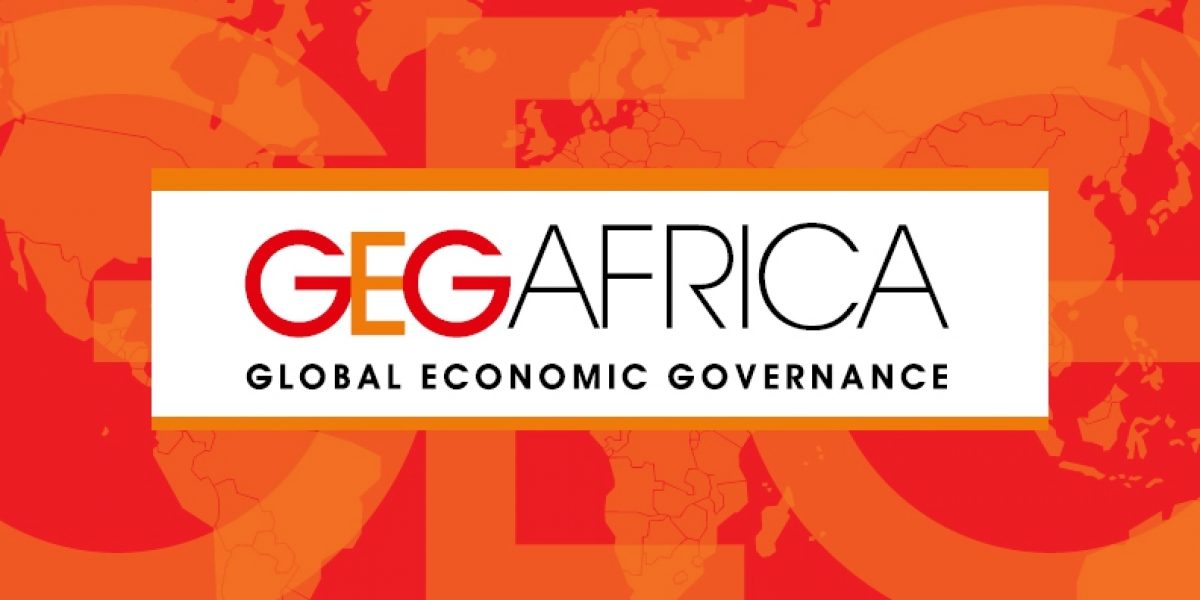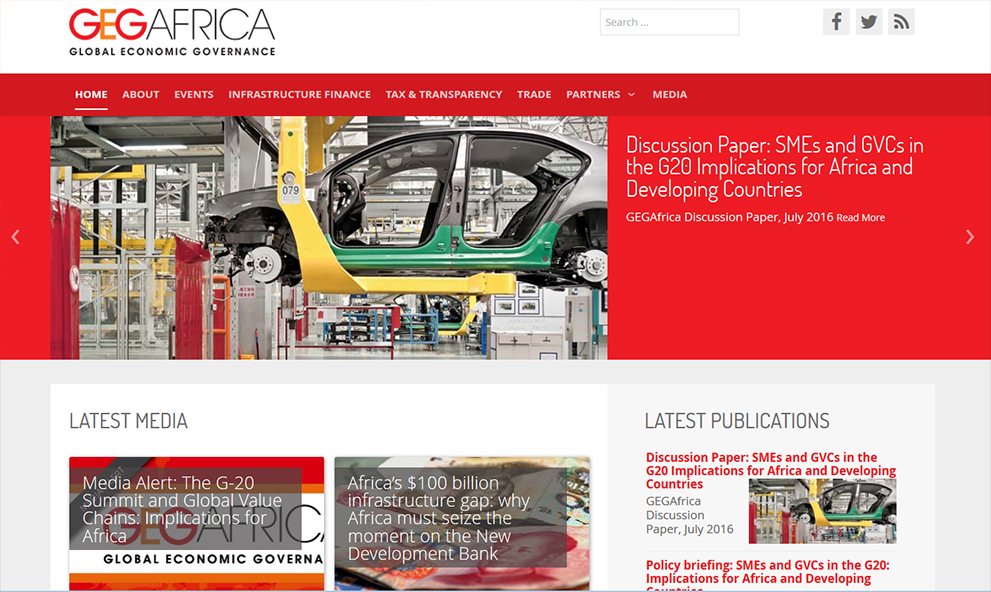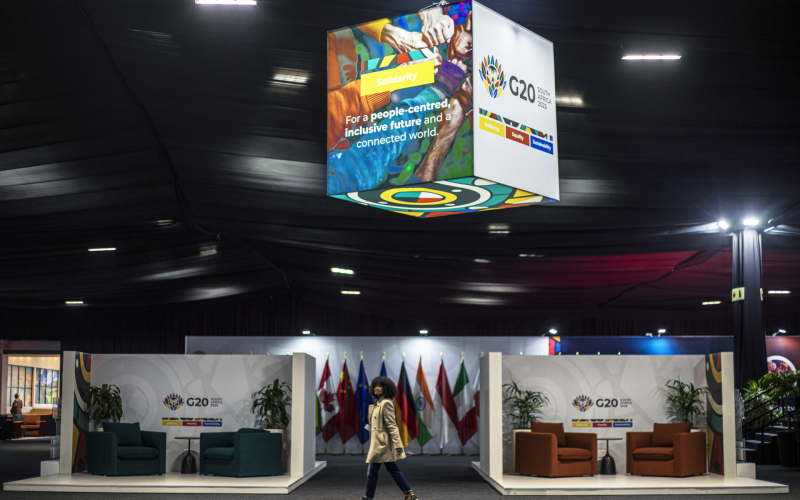The second phase of the programme started in March 2016 and will be implemented over a period of three years until March 2019. Funded by the UK’s Department for International Development (DFID), the programme endeavours to create an international system of global economic governance that works better for the poor in Africa. It is part of the UK’s shared priority with South Africa to accelerate the attainment of Sustainable Development Goals through an improved system of global economic governance. read more on www.gegafrica.org.
Publications
Informing the Approach of Multilateral Development Banks to Use of Country Systems
Most countries consider infrastructure development as a key enabler of development, as it spurs job creation, trade and investment. For many developing countries, multilateral development banks (MDBs) are important in addressing their infrastructure financing deficits. MDBs have historically dictated the terms of financing by prescribing rules on financial management and environmental and social safeguards, despite the presence of similar systems in the relevant countries. Increasingly, however, both MDBs and their borrowers are seeking to eliminate such extra requirements in favour of the full utilisation of countries’ own domestic systems and processes, broadly referred to as the ‘use of country systems’ (UCS). The defining benefit of greater UCS to MDBs is that it respects the sovereignty of countries by not imposing external conditionalities. UCS also promotes national ownership of development projects by increasing the involvement of domestic actors, institutions and processes, and hence increasing projects’ sustainability. At the same time, UCS can strengthen domestic systems through greater utilisation, thereby exposing deficiencies that can be corrected and eliminating the duplication of costs and efforts engendered by parallel systems. Ultimately, UCS gives developing countries a greater stake in their own development trajectory, as well as the tools to manage the process better. Yet the greater uptake of an UCS approach by MDBs and borrowers has been hampered by a number of key challenges. Firstly, UCS increases financial, reputational and development risks for all participants, notably around procurement functions. Secondly, the inflexibility of MDBs’ approaches to safeguards, together with implementation challenges, has hindered greater uptake. Thirdly, borrowers and MDBs face political challenges that hinder greater cooperation in this regard. Lastly, both MDBs and countries often lack the capacity to adequately implement UCS. This discussion paper explores the opportunities and challenges facing UCS in Africa by critically examining both literature and case studies of select African countries (Kenya, Morocco and South Africa) and their perceptions of and experiences with UCS. Ultimately, the research aims to contribute to a better understanding of UCS to inform the approach of MDBs operating in Africa – both established MDBs and emerging MDBs such as the New Development Bank.
Authors: Cyril Prinsloo, Chelsea Markowitz, El Mostafa Jamea and Kwame Owino
Informing the Approach of Multilateral Development Banks to Use of Country Systems
A greater use of countries’ public financial management (PFM) and environmental and social frameworks (ESFs) could offer developing countries a larger stake in their development trajectory. Greater use of country systems (UCS) will also assist developing countries to enhance their capacity (through strengthened legislation, regulations and institutions) to better manage this process. Multilateral development banks (MDBs) have a significant role to play in this process by facilitating infrastructure finance to developing countries using domestic PFM and ESF systems. However, significant political and technical challenges hinder greater uptake of a UCS approach by MDBs. These challenges include increased financial, reputational and development risks; persistently weak country systems; wavering or questionable commitment to the UCS agenda; significant procurement issues in MDB-financed projects; and inadequate capacity of key stakeholders. This briefing (drawing on a more in-depth discussion paper) highlights these challenges and offers recommendations on how MDBs and borrowing and non-borrowing countries can contribute to greater UCS.
Author: Cyril Prinsloo
The New Development Bank as an Advocate of Country Systems
The New Development Bank (NDB) locates the use of country systems (UCS) at the core of its operational policies. While facilitating infrastructure financing through country systems holds significant financial and non-financial benefits for developing countries, the experiences of other multilateral development banks (MDBs) have highlighted some key challenges: increased risks, weak country systems, questionable commitment of member states to the UCS agenda, procurement challenges and capacity-building constraints. By analysing the NDB’s nascent approach to UCS and drawing on the experiences of traditional MDBs, this briefing offers recommendations to the NDB on how it can strengthen its UCS approach. It also raises pertinent considerations for the NDB, its member countries and others looking to join the bank as it considers expanding its membership.
Author: Cyril Prinsloo
Mapping Current Trends in Infrastructure Financing In Low-Income Countries in Africa within the Context of the African Development Fund
This paper examines the role of the African Development Fund (ADF) in its efforts to support African low-income countries (LICs) in meeting their infrastructure financing needs. African LICs currently face tremendous infrastructure financing gaps, but are unable to access the concessional loans required to finance these. As a result, many are turning to non-concessional sources of financing, which could have a negative impact on their debt levels. Moreover, improperly managed projects, a lack of private sector involvement and insufficient technical expertise among African government officials also detract from the successful implementation of infrastructure projects on the continent. All of these problems highlight the extremely complex nature of infrastructure financing within LICs. As the concessional branch of the African Bank Group, the ADF is tasked with providing infrastructure financing to African LICs at affordable rates. However, its ability to do so is constrained by a variety of factors, including insufficient funding. In light of the upcoming ADF-14 meeting in November 2016, this paper examines what the ADF can do to improve the services it offers to LICs and mobilise additional finance, while also examining issues that pertain to the fund’s own constrained operations and handicap. It concludes with policy recommendations to assist the ADF in improving its technical and operational functioning, in order to ensure that African LICs receive adequate assistance and levels of finance from the ADF in the years to come.
Authors: Talitha Bertelsmann-Scott, Chelsea Markowitz and Asmita Parshotam
Partnering with the New Development Bank: What Improved Services Can It Offer Middle-Income Countries?
Multilateral development banks increasingly struggle to respond effectively to the needs of middle-income countries, influencing not only their potential development impact but also their own financial stability. This challenge has been driven by a changing external environment, including additional competition from other financiers, the changing needs of middle-income countries and institutional constraints. Business processes that deter greater borrowing by countries, especially in the presence of other financiers with less strenuous requirements, also contribute to this situation. These include lengthy loan approval processes, limited use of in-country management systems and sensitivities around environmental and social safeguards. There is also a need for greater responsiveness and an emphasis on the importance of knowledge services. This paper highlights some of these challenges and offers some alternative solutions. The New Development Bank, as a new entrant to the development finance milieu, will do well to draw on the experiences of existing multilateral development banks to improve its offerings to countries.
Author: Cyril Prinsloo
Illicit Financial Flows Estimating Trade Mispricing and Trade-Based Money Laundering For Five African Countries
This paper focuses on the commercial tax evasion component of illicit financial flows (IFFs), clarifying concepts often used interchangeably, namely transfer pricing, abusive transfer pricing, trade mispricing (or trade mis-invoicing), trade-based money laundering (TBML), tax evasion and tax avoidance. It also shows how they link to IFFs. It estimates the extent of trade mispricing by enhancing the model currently used by Global Financial Integrity, and by developing a TBML model as a means of quantifying IFFs between two developing countries. There are data challenges with this methodology, as it is an estimation of illegal or hidden activities, using the International Monetary Funds Direction of Trade methodology. The research points to declining trade mispricing in South Africa and Zambia for the period 2013Ð2 015, and Nigeria for the period 2013Ð2 014. Morocco and Egypt exhibit increasing trade mispricing from 2013 to 2014. The TBML model, which addresses the criticism regarding flows between two developing countries, points to increasing financial outflows for all five countries. These flows mean less revenue is available to the fiscus to invest in socio-economic infrastructure and pro-poor growth strategies, which would benefit women and the poor. Policy recommendations address commercial tax evasion as well as proposals to remedy the data anomalies.
Authors: Kathy Nicolaou-Manias and Yuchen Wu
Improving Infrastructure Finance for Low-Income Countries: Recommendations for the ADF
Low-income countries (LICs) in sub-Saharan Africa face a substantial infrastructure-financing gap. Multilateral development banks (MD Bs) have traditionally played an important role in mobilising finance for infrastructure in LICs, but their funding alone cannot match demand. The African Development Bank’s (AfDB) concessional window, the African Development Fund (ADF), is a key infrastructure financier for African LICs, and comprises 37 regional member countries (RMCs), including emerging markets and fragile states. However, in recent years the ADF has faced funding and technical constraints. This policy brief, based on a discussion paper, outlines the ADF’s role in providing infrastructure financing to LICs and the challenges that countries face in accessing these funds. It also examines the changing context confronting LICs as they weigh their infrastructure demands against the requirement to maintain sustainable debt levels. Lastly, the brief explores the challenges and opportunities of mobilising additional finance for LICs.
Author: Chelsea Markowitz
E-commerce in Africa Definitions, Issues and the Evolving International Regulatory Landscape
E-commerce is becoming an integrated part of the global economy, with revenue in business-to-business and business-to-consumer e-commerce transactions rapidly increasing. This development has prompted countries to introduce regulations to address the challenges of e-commerce faced by consumers, producers, service providers and governments. Of particular interest is the opportunities e-commerce offers entrepreneurs as well as small, medium and micro enterprises to reach a wider market and potentially link into cross-border value chains and tap into foreign markets. Considering the developmental constraints faced by many developing and least-developed countries in Africa, e-commerce and the productive use of the information and communications technology sector could help to address some of the systemic issues. However, Africa currently lacks comprehensive legislation to address the challenges faced by the sector. While domestic legislation needs to be cognisant of consumer protection in relation to distance selling, electronic transactions, cybercrime, data protection and privacy, developed countries have started to address these issues in plurilateral and regional trade agreements. Considering that the majority of e-commerce companies are currently based in developed countries, these progressive regional agreements could become the benchmark for cross-border e-commerce transactions and divert investment and trade away from non-members. This paper considers the nature of e-commerce, the environmental factors that affect the sector’s development and uptake, the current state of negotiations in the World Trade Organization, and how regulation is being shaped by the so-called mega-regional trade agreements. Based on literature review, a framework is provided to guide further studies on the measurement of e-commerce, the barriers affecting e-commerce, and the regulations that should be considered in developing a comprehensive enabling environment for e-commerce.
Authors: Heinrich Krogman and Nkululeko Khumalo
Trade Mispricing for Five African Countries
This briefing estimates the extent of trade mispricing, a form of commercial tax evasion, for five African countries and addresses the data challenges in gauging this component of illicit financial flows (IFFs). This is an estimation of illegal or hidden activities, using the International Monetary Fund (IMF) Direction of Trade (DOTS) methodology. The research points to declining trade mispricing in South Africa and Zambia for the period 2013–2015 and in Nigeria for the period 2013–2014. Morocco and Egypt exhibit increasing trade mispricing from 2013–2014. These flows mean reduced revenues to the fiscus to invest in socio-economic infrastructure and pro-poor growth strategies, which would benefit women and the poor. Policy recommendations address trade mispricing and propose remedies for the data anomalies.
Authors: Kathy Nicolaou-Manias
The New Development Bank: Towards Greater Efficiency
Multilateral development banks (MDBs) increasingly struggle to respond effectively to the needs of middle-income countries (MICs). This has influenced not only their potential development impact but also their own financial stability. Part of the challenge has been internal business processes that deter greater borrowing by countries, especially in the presence of other financiers with less strenuous requirements. These processes include lengthy loan approval processes, limited use of in-country management systems and sensitivities around environmental and social safeguards. There is also a need for greater responsiveness and an emphasis on the importance of knowledge services. This policy briefing (drawing on a more in-depth discussion paper) highlights some of these challenges and offers some alternative solutions. The New Development Bank (NDB), as a new entrant to the development finance milieu, will do well to draw on the experiences of existing MDBs to improve its offerings to countries.
Author: Cyril Prinsloo
SMEs and GVCs in the G20: Implications for Africa and Developing Countries
Download the Discussion Paper here
Download the Policy Briefing here
Increasing the participation of developing countries in global value chains (GVCs) is now an accepted G20 priority. However, there is disagreement over how multinational corporations (MNCs), which drive GVCs, can be persuaded to incorporate small and medium enterprises (SMEs) from developing countries into the GVCs they co-ordinate. The choices range from conscious industrial strategies oriented towards coercive measures designed to force MNCs to integrate SMEs into their value chains, to facilitative approaches designed to attract MNCs to invest and, over time, incorporate domestic suppliers into their value chains. Nonetheless, there is consensus on the key constraints that inhibit the growth of SMEs in general, and their inclusion into GVCs in particular: transaction costs; access to network infrastructure; and the capacity of firms and supporting institutional arrangements. Accordingly, we offer a high-level framework of recommendations for G20 states’ consideration.
Authors: Peter Draper and Chiziwiso Pswarayi
More about the project
Visit the GEG Africa website, or follow GEG Africa on Twitter or Facebook.









